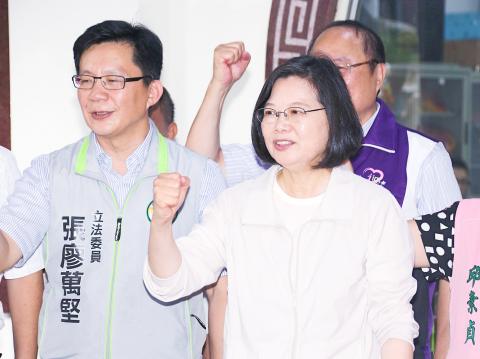Economic growth over the past three years was higher than that under the previous administration, and is projected to reach 2.46 percent this year, President Tsai Ing-wen (蔡英文) said yesterday.
Yesterday, Tsai visited the facilities of watercraft propeller manufacturer Solas (般若科技公司) in Taichung with Democratic Progressive Party (DPP) Legislator Chang Liao Wan-chien (張廖萬堅).
Speaking to reporters afterward, Tsai said that economic growth this year has reached 2.42 percent, and is expected to reach 2.46 percent before the end of the year — the highest growth rate among the Asian Tigers, Taiwan, Hong Kong, Singapore and South Korea, this year.

Photo: CNA
Taiwanese businesses moving facilities back home amid the US-China trade dispute have brought NT$540 billion (US$17.22 billion) in investment back to the nation, she said, adding that total investment could reach NT$800 billion before the end of the year.
“This is an explosive year for investment in Taiwan,” she said, adding that other domestic businesses and foreign investors were also investing more in the nation’s economy this year.
The government has complemented the investments with the tax cuts it implemented in May, the largest to date, she said.
The government is helping workers by raising the minimum monthly salary to NT$23,800, introducing new childcare subsidies and implementing new long-term healthcare policies, she added.
Addressing the anti-extradition bill protests in Hong Kong, Tsai said she hoped the democracy that Hong Kongers were fighting for could be realized.
National security officials have been meeting regularly due to increasingly complex international circumstances, she said.
Asked about public opinion polls showing that she leads Kaohsiung Mayor Han Kuo-yu (韓國瑜) going into next year’s president election, Tsai said that surveys should only be used for reference.
Separately yesterday, the Taiwan Forever Association held its annual fundraising dinner, which was attended by Taiwan New Constitution Foundation founder Koo Kwang-ming (辜寬敏) and DPP Chairman Cho Jung-tai (卓榮泰).
Tsai has a plan and would comprehensively consider each candidate before choosing a running mate, Cho said.
Koo, who has pushed for Tsai to choose former premier William Lai (賴清德) as a running mate, said that there was still a possibility that the two might run together.
They just need one or two more months to work things out, he added.
Tsai would continue to highlight the achievements of her administration over the next few months leading up to the election, party sources said.
Additional reporting by Lee Hsin-fang

CHANGING LANDSCAPE: Many of the part-time programs for educators were no longer needed, as many teachers obtain a graduate degree before joining the workforce, experts said Taiwanese universities this year canceled 86 programs, Ministry of Education data showed, with educators attributing the closures to the nation’s low birthrate as well as shifting trends. Fifty-three of the shuttered programs were part-time postgraduate degree programs, about 62 percent of the total, the most in the past five years, the data showed. National Taiwan Normal University (NTNU) discontinued the most part-time master’s programs, at 16: chemistry, life science, earth science, physics, fine arts, music, special education, health promotion and health education, educational psychology and counseling, education, design, Chinese as a second language, library and information sciences, mechatronics engineering, history, physical education

The Chinese military has boosted its capability to fight at a high tempo using the element of surprise and new technology, the Ministry of National Defense said in the Quadrennial Defense Review (QDR) published on Monday last week. The ministry highlighted Chinese People’s Liberation Army (PLA) developments showing significant changes in Beijing’s strategy for war on Taiwan. The PLA has made significant headway in building capabilities for all-weather, multi-domain intelligence, surveillance, operational control and a joint air-sea blockade against Taiwan’s lines of communication, it said. The PLA has also improved its capabilities in direct amphibious assault operations aimed at seizing strategically important beaches,

‘MALIGN PURPOSE’: Governments around the world conduct espionage operations, but China’s is different, as its ultimate goal is annexation, a think tank head said Taiwan is facing a growing existential threat from its own people spying for China, experts said, as the government seeks to toughen measures to stop Beijing’s infiltration efforts and deter Taiwanese turncoats. While Beijing and Taipei have been spying on each other for years, experts said that espionage posed a bigger threat to Taiwan due to the risk of a Chinese attack. Taiwan’s intelligence agency said China used “diverse channels and tactics” to infiltrate the nation’s military, government agencies and pro-China organizations. The main targets were retired and active members of the military, persuaded by money, blackmail or pro-China ideology to steal

DEADLOCK: As the commission is unable to forum a quorum to review license renewal applications, the channel operators are not at fault and can air past their license date The National Communications Commission (NCC) yesterday said that the Public Television Service (PTS) and 36 other television and radio broadcasters could continue airing, despite the commission’s inability to meet a quorum to review their license renewal applications. The licenses of PTS and the other channels are set to expire between this month and June. The National Communications Commission Organization Act (國家通訊傳播委員會組織法) stipulates that the commission must meet the mandated quorum of four to hold a valid meeting. The seven-member commission currently has only three commissioners. “We have informed the channel operators of the progress we have made in reviewing their license renewal applications, and